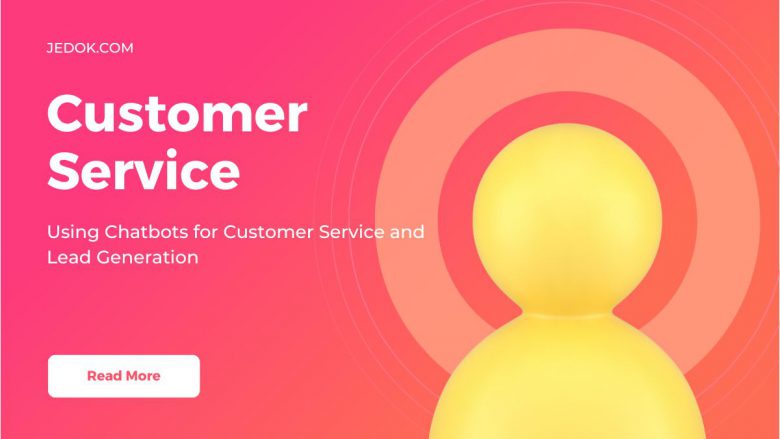
Chatbots have revolutionized the way businesses interact with their customers. They provide instant support, improve response times, and even assist in lead generation. In this blog post, we will explore the benefits of using chatbots for customer service and lead generation. We’ll also provide practical tips on how to implement and optimize chatbots to enhance your customer experience and generate valuable leads.
Streamline Customer Service with Chatbots:
One of the primary advantages of chatbots is their ability to streamline customer service operations. By integrating chatbots into your customer service strategy, you can provide efficient and effective support. Here are some key benefits:
1. Provide instant responses:
Today’s customers demand instant gratification – they want their queries solved in seconds, not minutes or hours. This is where chatbots come into play, providing quick and efficient responses to frequently asked questions (FAQs). Chatbots are computer programs that simulate human conversation using Artificial Intelligence (AI) and Natural Language Processing (NLP) technology, allowing them to understand customer requests and provide accurate answers within seconds.
One of the biggest benefits of using chatbots for customer service is the ability to eliminate wait times. Rather than waiting on hold or in a queue for a human agent, customers can receive immediate assistance from a chatbot. This not only improves customer satisfaction but also frees up agents to handle more complex issues that require personalized attention. Additionally, chatbots can operate 24/7 without breaks or vacations, ensuring that customers always have access to support whenever they need it.
2. Offer personalized support:
In today’s fast-paced business world, companies need to provide personalized support to their customers. One way of achieving this is by using chatbots. These automated tools can collect and analyze customer data, enabling them to deliver tailored responses and recommendations. This level of personalization not only enhances the customer experience but also helps businesses build long-lasting relationships with their clients.
Chatbots can gather information such as a customer’s purchase history, browsing behavior, and preferences. With this data, they can make personalized recommendations or offer solutions that meet the specific needs of each individual customer. Additionally, chatbots can identify patterns in customer behavior and relay this information back to the company’s marketing team for future campaigns or product development initiatives.
3. Reduce response times:
Chatbots have revolutionized the way customer service is delivered. With their advanced capabilities, they can handle multiple conversations simultaneously, dramatically reducing response times and wait times for customers. This feature alone makes chatbots incredibly valuable in terms of improving customer satisfaction and retention rates.
Another benefit of using chatbots for customer service is that they are available 24/7, which means that customers can get the help they need at any time, day or night. Not only does this provide peace of mind to customers who may be experiencing issues outside of regular business hours, but it also allows businesses to operate more efficiently by reducing the need for round-the-clock human support staff. Chatbots are also equipped with natural language processing (NLP) technology, which helps them understand complex queries and deliver accurate responses quickly and efficiently.
4. Resolve simple issues:
Chatbots are excellent at troubleshooting common problems and guiding customers through basic procedures. By automating these routine tasks, chatbots free up human agents to focus on more complex issues, improving efficiency and productivity.
Engage Customers and Capture Leads:
Chatbots are not just valuable for customer service but also for lead generation. Here’s how chatbots can help engage customers and capture leads:
- Interactive Conversations: Chatbots can engage visitors by initiating conversations, asking questions, and guiding them through the sales funnel. By simulating natural and interactive conversations, chatbots create a personalized and engaging experience.
- Personalized Recommendations: By analyzing customer data and behavior, chatbots can provide personalized product recommendations or suggest relevant content. This level of personalization enhances customer engagement and increases the chances of converting visitors into leads.
- Lead Qualification: Chatbots can ask targeted questions to understand customers’ needs, preferences, and purchase intent. This information helps in segmenting leads and prioritizing follow-up actions. By qualifying leads in real time, chatbots ensure that valuable opportunities are not missed.
- Automated Lead Nurturing: Chatbots can automate lead nurturing by sending personalized messages, updates, or offers to potential leads. By maintaining regular communication and providing valuable information, chatbots help move leads through the sales pipeline.
Conclusion:
Chatbots are powerful tools for improving customer service and generating leads. By streamlining customer support, providing instant responses, and offering personalized assistance, chatbots enhance the overall customer experience. Moreover, by engaging customers in interactive conversations, providing recommendations, and automating lead qualification and nurturing, chatbots contribute to lead generation efforts. Incorporating chatbots into your business strategy can help you optimize customer service, capture valuable leads, and ultimately drive business growth.


